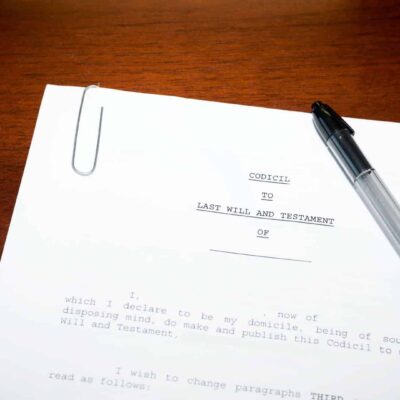When it comes to updating your Will, you may have heard of the term "Codicil".
A Codicil is a legal document that amends or adds to an existing Will.
Before computers and word processing, making a new Will required a solicitor’s clerk to write a lengthy document on parchment with quill and ink.
It was quicker and cheaper for the solicitor's firm if the clerk wrote a Codicil since it was a much shorter document.
So, are Codicils still a good idea in the 21st century?
In this blog post, we will explore what a codicil is, the advantages and disadvantages of adding one to your Will and whether you should use a Codicil or write a new Will altogether.
What Is A Codicil?
A Codicil is a document used to make changes to a Will. It is a separate legal document that is signed and witnessed in the same way as a Will.
Codicils can be used to make minor changes to a Will, such as adding a new beneficiary or changing an executor, without the need to write an entirely new document.
However, it is essential to note that a Codicil cannot be used to entirely revoke a Will, as this would require a new Will to be written.
Advantages Of Adding A Codicil To A Will
One of the main advantages of adding a Codicil is that it allows you to change your Will without having to rewrite it altogether.
This can be useful if you only need to make minor changes, such as adding or removing a beneficiary or updating the name of an executor. Another advantage of using a Codicil is that it can be a quicker and more cost-effective option than writing a new Will.
Disadvantages Of Adding A Codicil To A Will
There are also some disadvantages to adding a Codicil to a Will.
Let's start with some practical points. Nothing in your Will alerts the Executor to the existence of a Codicil, so if the documents become separated, your Executor may not know that a Codicil changed your wishes. In addition, your Executor needs to consider two documents to ensure they follow your wishes correctly.
However, the main reason that Codicils are a bad idea is privacy.
By law, any Will or Codicil that goes to probate becomes a public document (there is an exception for a very small number of members of the Royal Family.)
Any individual, anywhere in the world, can then obtain a copy of the probate, the Will, and any Codicil from the Government's website. It takes about 60 seconds and costs just £1.50.
If you have a Codicil to your Will, anyone can see that your wishes have changed. For the people affected, this may lead to feelings of anger and resentment towards you, which could lead to claims against your estate. Remember that the costs of any legal challenge, successful or not, will reduce how much your beneficiaries inherit.
Imagine that your Will includes a gift of £50,000 to a grandchild, but later you change your mind and want to reduce that to £25,000. If you make a new Will, the grandchild will only know that they were left £25,000. If you make a Codicil, the grandchild can see that you changed your mind, that they "lost out" by £25,000, and will wonder why.
Suppose the only change made by a Codicil is to change an Executor where the original Executor died or is no longer capable. In that case, that is not likely to cause problems. Otherwise, any change a Codicil makes means that someone has gained and someone else has lost.
If you have paid a solicitor or Will writer to prepare a Codicil for you and they did not tell you about this privacy issue, I would question whether they have done their job correctly.
Updating Your Will
If you want to make significant changes to your Will, we would advise that it would be more appropriate to write a new Will altogether rather than adding a Codicil.
This is especially true if you need to make significant changes to your Will.
When updating your Will, it is vital to seek the advice of a solicitor who can guide you through the process and ensure that your wishes are correctly reflected in the updated document.
Your solicitor can also help you avoid any potential disputes arising from unclear or conflicting instructions.
If you would like to make a Will or update an existing Will, why not book a free initial appointment with Stephen Sampson or Jess Riseborough in our Arundel office?
Call Monan Gozzett LLP on 01903 927055, or email ssampson@monangozzett.com or jriseborough@monangozzett.com.
If you would like to speak to our expert legal team about this, or any related subject then please contact our team by phone on 0207 936 6329, Email or by completing our Quick Contact Form below.
